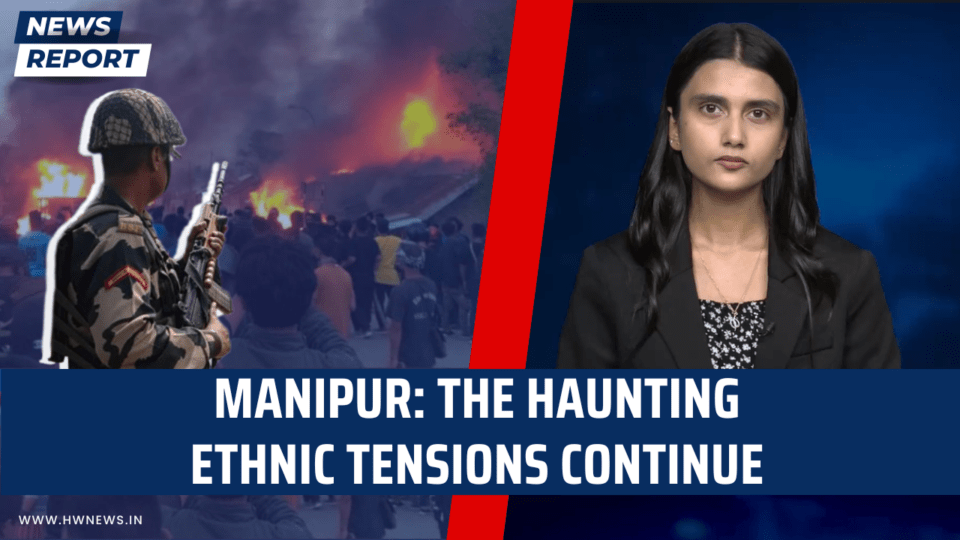The haunting specter of ethnic tensions has once again descended upon the embattled land of Manipur, as the veil of relative tranquility was violently torn asunder by a brutal attack. The Naga-dominated Ukhrul district, which had briefly tasted respite from the surges of violence, found itself plunged back into chaos with a chilling assault that not only rekindled the flames of conflict but also unmasked the depths of animosity that had been plaguing for well over a hundred days. This latest surge of violence, erupting on the 5th of August, claimed the lives of three individuals – Thangkhokai Haokip, Jamkhogin Haokip, and Hollenson Baite. Their fates were tragically sealed by a ruthless cocktail of torture, broken limbs, and a final shot fired at close range. The trio, stalwart defenders of their Kuki village in Thowai, had been jolted from their slumber in the early morning hours by a gang of heavily armed assailants. The meticulousness of their infiltration and the savagery of the ensuing assault bore the chilling imprint of seasoned insurgents. The audacity of the attack, deep within the Naga-dominated heartland, offers a grim hint at the assailants’ potential origin – a shadowy crossing of the India-Myanmar border. This gruesome episode served a dual purpose: not only did it claim lives, but it also cunningly sought to exacerbate the already festering schism between the Kuki and Tangkhul Naga communities. This bout of violence fits into a broader tapestry of attacks that have scarred the region. The Thoubal district, too, was marred by tragedy as unidentified gunmen unleashed their terror, targeting three young men from a minority community. The echoes of this atrocity reverberate within the broader context of recurrent weapon looting. It is a disturbing fact that insurgents have been armed with sophisticated artillery pilfered from police stations and armories. In the wake of such harrowing incidents, the Indigenous Tribal Leaders’ Forum has vehemently called for enhanced safeguards for tribal communities, accentuating the urgency of reclaiming stolen arms to quell the potential for further mayhem. Interestingly, the Ukhrul attack unfolded closely on the heels of Manipur’s attempt to resettle those uprooted by the vicious vortex of ethnic violence. However, the well-intentioned plan to provide refuge through prefabricated housing collided with resistance in Tangkhul Naga-inhabited Ukhrul. Both the resident and aspirant Kuki communities found common ground, rejecting this proposal as superfluous, illuminating the intricate interplay of complexities within these profoundly layered ethnic dynamics. Yet, glimmers of hope emanate from the depths of the turmoil. In a rare display of cooperative resilience, Manipur Chief Minister N. Biren Singh heralded the return of over 212 Meitei people who had sought asylum across the Myanmar border. The collaborative effort, orchestrated with the Myanmar Army, underscores the pivotal role of cross-border coordination in addressing the crisis. The Free Movement Regime, fostering movement within a 16-kilometer border span, proved instrumental in facilitating the safe repatriation of those ensnared in the clutches of violence. To counter the escalating unrest, the Manipur Police issued a public plea for the return of pilfered arms, ammunition, and explosives. The unabated pillaging of law enforcement armaments has only served to fuel the conflagration and intensify the urgency surrounding the reclamation of these lethal assets. In a bid to quell the dissemination of misinformation and unfounded videos, a dedicated helpline has been instituted by the government. As the conflict continues to surge, its destructive wake does not merely consume lives. The embers of instability ignited a blaze within Imphal, where the residence of former Congress MP Thangso Baite succumbed to fire, leaving ruin in its wake. The investigation unfolds, underscoring the delicate fragility gripping the region. In summation, the recent conflagration of violence in Manipur’s ethnic strife has shattered a fragile interlude, catapulting communities back into the abyss of animosity. The brutality of these attacks serves as a somber reminder of the urgency of quelling the flames and averting further carnage. The path to peace must be paved with cross-border collaboration and the reclamation of stolen weaponry. Ultimately, the prospect of lasting stability and coexistence among Manipur’s diverse ethnic tapestry necessitates a holistic approach addressing the historical and socio-political intricacies that stoke these tensions.
#Manipur #Kuki #Meitei #Myanmar #NBirenSingh #ManipurUnrest #Haunting #Imphal
As an independent media platform, we do not take advertisements from governments and corporate houses. It is you, our readers, who have supported us on our journey to do honest and unbiased journalism. Please contribute, so that we can continue to do the same in future.

